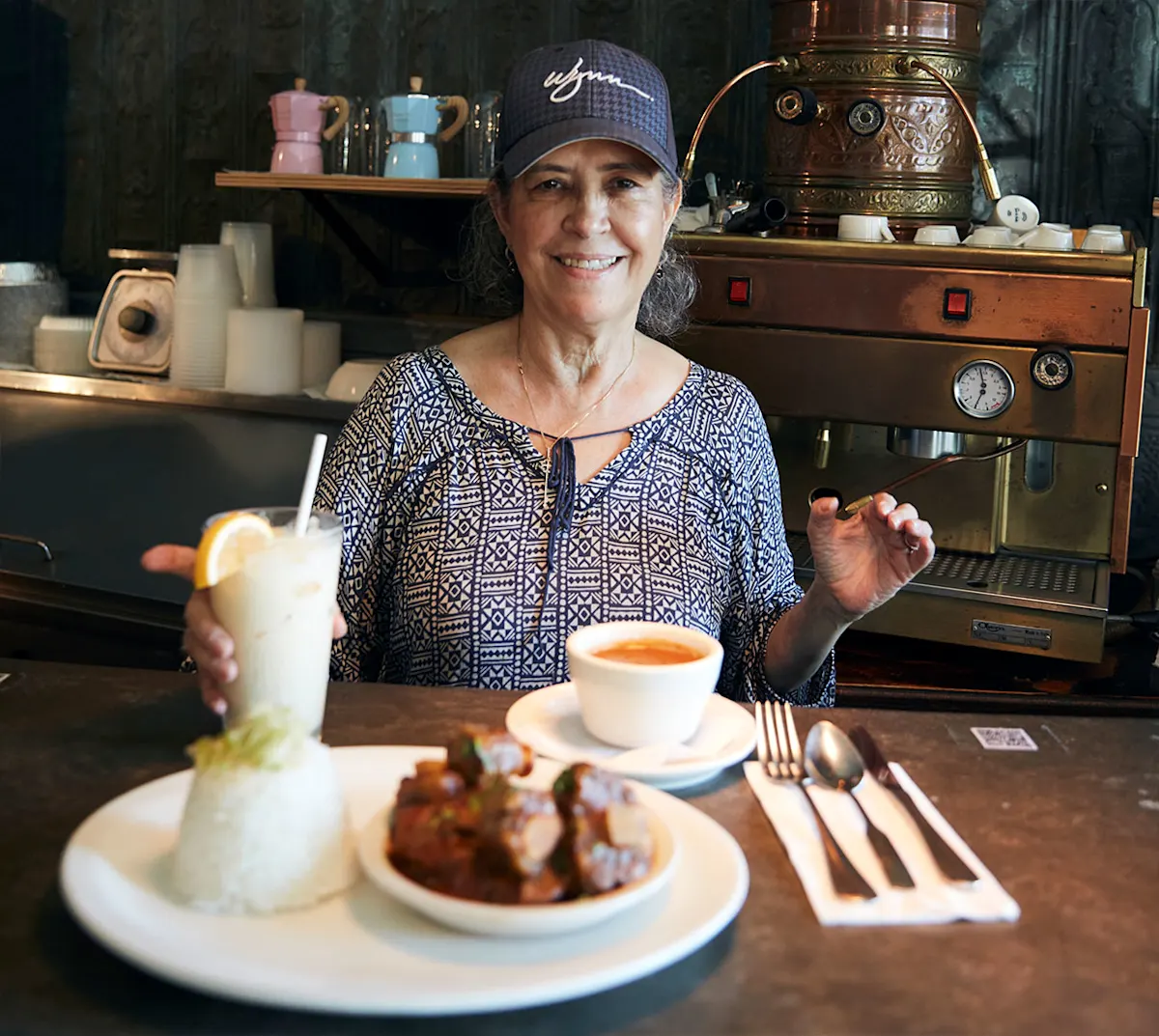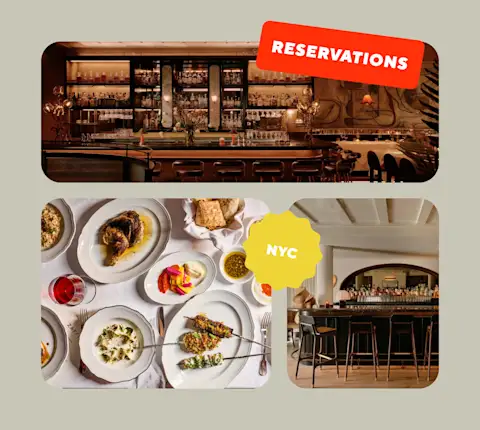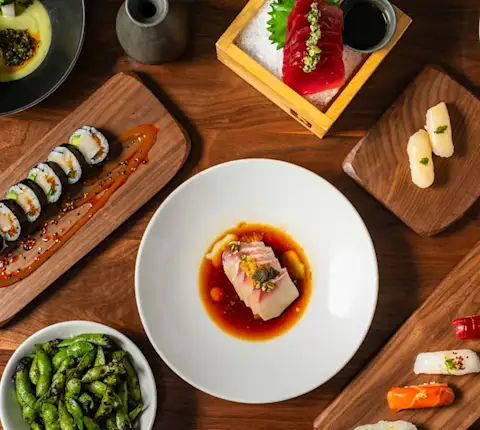The call came on a Sunday. Maritza Abreu’s family’s restaurant, Puerto Viejo, was closed for the day, but her aunt lived across the street and saw smoke coming out of the building. The Abreus raced to the scene, but it was too late. Their beloved business, a decades-old staple of the community in Prospect Heights, Brooklyn, had been destroyed by a fire.
“It was really, really tough because this had been the only source of income for my parents for so long,” recalls Maritza, daughter of Puerto Viejo’s owners and founders, Eduardo and Cristina Abreu. “Having it taken away from them so suddenly — they weren't prepared for that.”
Since Eduardo Sr. first opened the place with his late business partner, Ernesto Vicioso, in 1986, Puerto Viejo had functioned as the neighborhood luncheonette.
But, as it turns out, good things often rise out of ashes. While inspecting the damage the fire had caused, the Abreus’ son, Eduardo Jr., discovered something interesting.
“I was at work, climbing the corporate ladder at the time,” says Maritza, “and my brother called me and said, ‘I need you to come here and see this.’”
There, beneath the dust and debris, were the building’s original patina ceilings, walls, and beams — beautiful and historic architectural details long hidden under cheap sheetrock that had been installed by a previous tenant and destroyed in the fire.
“It was incredible,” says Maritza, “like a whole new space had revealed itself in front of us.”

Convincing their parents to embark on a full remodel to restore the splendor of the original space was no easy task, but Maritza and Eduardo Jr. were convinced that it was what the restaurant needed to survive in Prospect Heights, already a rapidly gentrifying neighborhood by 2011, the year of the fire. Since Eduardo Sr. first opened the place with his late business partner, Ernesto Vicioso, in 1986, Puerto Viejo had functioned as the neighborhood luncheonette. No table service, no frills, just good, honest Dominican home cooking, prepared in batches and served from a steam table to the local mechanics and cab drivers, who relied on the $3.75 lunch special to get through long days of low pay.
Eduardo had emigrated to New York from a small village in the Dominican Republic back in the early ’70s and knew what it was like to work minimum wage with minimal English. He was a teacher back home, but spent his first several years in the U.S. stuck in the back of windowless restaurant kitchens before he taught himself English, worked his way up to front-of-house staff, and finally saved enough money to open Puerto Viejo.
In 2012, Puerto Viejo reopened its doors. In place of the steam tray counter is a big wraparound bar serving homemade sangria and fresh juices.
“My earliest memory of the restaurant is taking the train from school, getting off at Clinton-Washington, and having my father meet me at the station and drive me to the restaurant,” Maritza recalls. “I would have an early dinner, bistec encebollado with tostones — that was my dish — and then I would go straight to the jukebox. They had this old jukebox and I would put on all my Latin favorites, salsas and merengues and ballads and of course Marc Anthony — his first album. That was my playtime.”
But after the fire, as Maritza and her brother stood amid the wreckage, debating what to do, they had to acknowledge that Prospect Heights was undergoing a major shift. Springing up in place of the familiar taxi depots and auto shops that had long employed their primary clientele was a new world of fancy boutiques and cutesy cafes and rapidly rising rents. “Maritza, I need you to help me build a case here with our parents,” Eduardo Jr. said. “The neighborhood is changing. This is an opportunity for us to stay in the game and continue providing our food to the new people moving into the area.”

After a not insignificant amount of convincing, they succeeded. “As the next generation, we saw the future and had the vision,” says Maritza. “We knew it was going to pay off in the end.”
But at the same time, she adds, the transformation never would have been possible without the help of their original community, who lent money and manpower and moral support over the full year of renovations that followed. “I remember the week before we opened; we were out of funds and we still had a few more walls that needed to be painted. Our friends and community came over, grabbed brushes, and helped us paint.”
Today, Puerto Viejo may look different, but its spirit remains the same.
In 2012, Puerto Viejo reopened its doors. In place of the steam tray counter is a big wraparound bar serving homemade sangria and fresh juices. Sun shines through greenery-filled windows during breakfast and lunch service and wooden tables are set with flickering candles when dinner begins.
But on the menu, the belly-warming Dominican classics remain: crackly-juicy hunks of pernil, a slow-cooked pork dish; pollo guisado so tender it falls off the bone with the poke of a fork; garlicky mounds of mofongo (mashed green plantains with garlic) bathed in a rich tomato-kissed broth; and of course, the Abreu family’s famous hot sauce, a smoky-spicy blend of garlic, salt, vinegar, and scotch bonnet peppers imported straight from the Dominican Republic.

The sauce became so beloved by customers that, in 2018, Maritza decided to quit her corporate job and devote herself full-time to the family business, bottling and marketing the hot sauce as Pisqueya. The name is a portmanteau of “picante,” which means spicy in Spanish, and “quisqueya,” the indigenous Taíno name for the island that encompasses the Dominican Republic and Haiti. Maritza has since developed two more flavors to go alongside the family’s original Smoky Hot Sauce: a zesty green Medium Buzz Sauce made with jalapeños and habaneros, and a passionfruit-based Spicy Sweet Sauce that’s featured in the latest season of the popular YouTube series “Hot Ones.”
The sauce became so beloved by customers that, in 2018, Maritza decided to quit her corporate job and devote herself full-time to the family business, bottling and marketing the hot sauce as Pisqueya.
Today, Puerto Viejo may look different, but its spirit remains the same. Nearly every day you’ll find Cristina and Eduardo Sr. behind the bar, darting in and out of the kitchen, smiling and greeting guests as they arrive.
“My mom believes that anybody who walks through the door needs to be attended to immediately — like, immediately,” laughs Maritza. “And she has a sixth sense where she knows exactly when somebody is about to walk through the door. So whenever she's at the restaurant, she's going to be yelling ‘la puerta!’ And then here comes my uncle yelling ‘caliente!’ as he comes from the kitchen with a big steaming pot. It’s a family establishment. It’s about comfort and warmth and informality. And when you’re here, it’s going to feel like home.”
Order from Puerto ViejoPHOTO CREDIT: Paul Quitoriano






